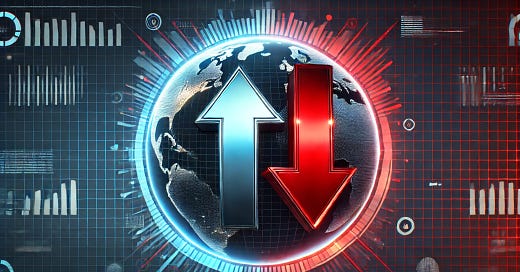⤴⤵ Up Wing/Down Wing #23
A curated selection of pro-progress and anti-progress news items from the week that was
In case you missed it .. .
😨 How the Crisis Decade set the stage for an Up Wing 21st Century (Monday)
✨ Central planning in the Age of AI: A Quick Q&A with … economist and regulation expert Lynne Kiesling (Tuesday)
💊💉 Will the anti-obesity wonder drugs work wonders for the US economy? (Wednesday)
✨⏩ My chat (+transcript) with ... economist Robin Hanson on AI, innovation, and economic reality (Thursday)
🚀 SpaceX is making a space Mayflower voyage possible (Friday)
Up Wing Things
🗽 The next president inherits a remarkable economy. The American economy is outperforming all major developed nations, growing nearly 3 percent percent over the past year. Unlike other countries' growth, which came mainly from increased labor hours, US growth reflects greater productivity — rising 6.7 percent since late 2019. What’s more inflation has fallen to 2.7 percent while maintaining robust growth, a "Goldilocks" outcome few predicted. The economy benefits from America's domestic energy advantage and technological leadership, with US companies leading in AI adoption and productivity gains in key sectors. Higher productivity growth suggests the economy's sustainable growth rate might exceed previous 1.8 percent estimates, potentially reaching 2-2.3 percent. More good news: Wages are now outpacing inflation since mid-2023.
🛢️ Efficiency-boosting tech has propelled US oil to new heights. The US oil and gas industry has now become the most productive industry in the country, surpassing tech, with major advancements in drilling efficiency and technology. Innovations, like Matador Resources' "U-turn" well and autonomous drill bits, have reduced costs and increased output. Productivity nearly tripled over a decade, contributing to economic growth and helping to reduce inflation impacts by keeping energy prices low. Despite challenges like potential resource depletion, the industry’s high productivity and investor appeal have kept it competitive globally, even pressuring OPEC by maintaining production amid lower prices. (Bberg)
☠️ The “Death Clock” uses AI to predict how long you’ll live. The new AI app, Death Clock, founded by Brent Franson, predicts users' life expectancy while helping them extend and improve their quality of life. Based on 1,217 studies with 53 million participants, it calculates an approximate date of death, biological age at time of passing, and health scores, offering personalized plans for longevity. Users receive tailored recommendations on lifestyle changes, screenings, and supplements, and can securely upload health data for custom insights. Apps like Death Clock can support proactive healthcare. (Debrief)
⚛️ Pacific Fusion is aiming for commercial fusion energy by decade’s end. Eric Lander, former head of the Human Genome Project, has launched Pacific Fusion, a Silicon Valley startup aiming to solve the climate crisis with clean fusion energy. Partnering with scientists from top national labs, the company is developing a method that has only recently become feasible: “The method it’s pursuing is called pulsed magnetic fusion, which involves inserting tiny containers of deuterium-tritium fuel into a chamber and blasting large electrical pulses through them to magnetically squeeze the fuel containers and achieve fusion.” Funded by $900 million from investors like Hemant Taneja, Eric Schmidt, and Reid Hoffman, Pacific Fusion hopes to demonstrate a net-positive energy pulse by the early 2030s, with commercial plants expected later in the decade. (Wired)
Keep reading with a 7-day free trial
Subscribe to Faster, Please! to keep reading this post and get 7 days of free access to the full post archives.




